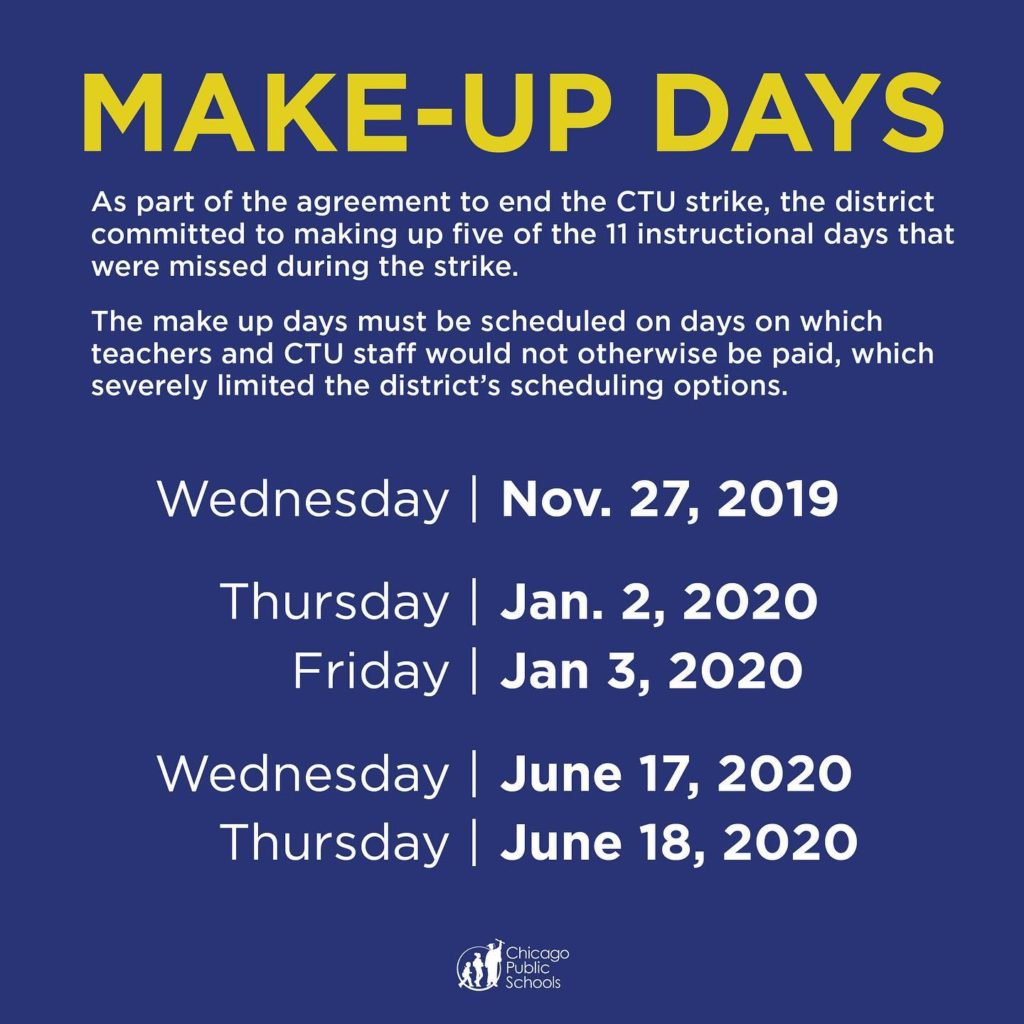Note: This post has been updated to discuss funding issues.
Parents and teachers are already complaining about the proposed make-up days to recoup time lost during the CTU/SEIU strike. The district is proposing to stay in the day before Thanksgiving, cut winter break short by two days, and add two student days to the end of the school year.
None of this accounts for the strong possibility of snow days in Chicago tacking even more time on the end of the year. Already, Chicago Public Schools has one of the latest school-year ends in the metro area, making it hard for kids to get summer jobs, register for camp, etc.
Last night, a couple of teacher friends of mine put their heads together and offered a better solution. One teacher told me that in the past, professional development days during the year were changed to regular school days (“days of student attendance,” in the official jargon), and the PD days for teachers were added to the end of the year. So kids got more real learning time, and teachers had more time to themselves in June. Then, they can dive deep on topics that require concentration. This also could mean they would have less need to attend summer training, and more time for a real summer break.
Another teacher friend chimed in and suggested that extra training time at the end of the year could be put to work teaching teachers how to put the science of reading to work when helping students learn to read.
Let’s Use Strike Days to Learn About Effective Reading Instruction
The sad reality is, many teachers are still learning to teach reading using approaches that have been debunked. Teachers need to learn the sound structure of the English language–phonics–and they need to learn to teach it systematically, not haphazardly, to beginning readers, especially students for whom English is not their first language. (As the mom of a dual-language learner, I see this up close every day. I’m lucky; my child can read. But English spelling remains a challenge for her, and I firmly believe it is in part because she didn’t receive the kind of support she needed in grades 1-3 to really break down words and put them back together.)
Students are quite literally the casualties of this gap in teacher knowledge. My teacher friend pointed to the Wilson method of teaching reading, which was developed to help struggling readers with dyslexia, as a critical need in Chicago. She’s not the first teacher I’ve heard say that, either. But whether it’s Wilson, or the LETRS training teachers have taken in Pennsylvania, Maryland and Mississippi, or another approach that has science behind it, we need that training in Chicago.
Now’s our chance. Here’s hoping CPS rethinks how to make the most of the strike days for teachers and kids, not just for this year, but for years to come.
But Wait, That Means Teachers Will Get Paid All Those Days!
Yes, yes it does. Teachers will be paid for the days they would have had PD during the school year, and instead are now teaching kids. And teacher will be paid for the extra PD days in June.
So, if we did that, wouldn’t the Mayor have to go back on her word that the strike days would not be made up? Yes, she would. But she’s already gone back halfway, and the half measure is merely annoying parents and teachers, including many of both who voted for her, and hurting the kids.
How are we going to pay for it? Well, how we’re going to pay for everything related to the teachers contract seems to be a bit of a mystery right now. I’m sure people will argue over the nickel-and-dime solutions (which amount to tens of millions in a multi-billion-dollar budget, like who pays for police in schools and a chunk of teacher pension money.
But this is where I’d like to see the union get real and stop answering questions about how to pay for the contract and strike expenses by simply answering “Rich people,” or calling for the return of a corporate head tax that went extinct for a reason. Will CTU send tens of thousands of members in red shirts to Springfield to push for a graduated income tax to fund schools? In my view, it better.
Maureen Kelleher
Latest posts by Maureen Kelleher (see all)
- CPS Parents Wanted for Research Study - March 27, 2023
- Tomorrow: Cure Violence with #Belonging - August 17, 2022
- Still Looking for Summer Camp? - June 13, 2022
